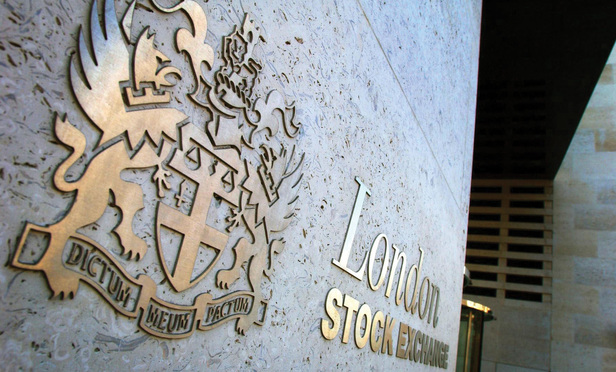DWF sizes up potential IPO as firm considers 'alternative structures' to drive growth
Firm confirms it is considering floating in what would be largest UK law firm listing to date
June 15, 2018 at 05:25 AM
4 minute read
DWF has confirmed that it is considering an initial public offering (IPO) on the London Stock Exchange, in what would be the largest UK law firm listing to date.
The potential listing, which would see it become the sixth UK law firm to go public, is one of "a number of strategic options" the firm is looking at as part of its plans to increase investment in technology and its 'Connected Services' business.
In a statement, the firm said: "To enable us to deliver on our strategy and for us to better serve our clients through an increasingly international and differentiated offering, we have plans to increase our investment in information technology and Connected Services.
"The current corporate structure of our business continues to work very well and has enabled us to deliver our key business objectives with record growth this year – but as a business which is committed to 'doings things differently' it is also important to consider alternative structures which can set us apart from other legal businesses.
"To that end, we have been considering a number of strategic options for our business, including the possibility of an IPO on the London Stock Exchange. If we were to proceed with an IPO, we believe that it would enable us to achieve our strategic objectives more quickly, while also enhancing our ability to attract and retain the best talent and to incentivise our people by aligning them through offering ownership within the business.
The firm added that while it is focused on an IPO, "a number of options are available".
The firm's Connected Services arm is a standalone business that sits alongside DWF's core legal offering, incorporating its in-house advocacy team, tech consultancy DWF 360, a claims management business, a forensic accountancy arm, research and development division DWF Ventures and its resourcing and consultancy offerings.
If DWF goes ahead with a float, it will follow the lead of Gateley, which became the first UK law firm to list in 2015, and Gordon Dadds, which joined the public markets last summer via a reverse takeover of AIM-listed marketing company Work Group.
Two other UK firms have listed on AIM this year – Keystone Law and Rosenblatt – while regional firm Knights announced it is set to float later this month.
DWF posted revenue of £201.3m for the 2016-17 financial year, up from £187.1m the preceding year. However, PEP fell to £305,000 from £338,000. Equity partner numbers grew 5.8% to an average across the year of 68.9 and total partner numbers grew 9.4% to an average of 275.8.
In November the firm announced a 23% increase in revenue for the first half of 2017-18, with turnover for the six month period hitting £113.5m.
News of the plans comes after the firm last year recruited former DLA Piper chairman Sir Nigel Knowles as its new chairman – a rare high-profile example of a former law firm leader joining another firm in a management capacity.
The expansive firm has grown rapidly in recent years, with managing partner Andrew Leaitherland - who was last year reappointed for a fifth term in the top job – open about his ambitions for growth.
While the firm's initial focus was on the UK, it has more recently turned its attention to international development. Last year it opened its first office in Italy, with the hire of a 16-strong Milan team led by four partners, while in February it launched in Qatar and expanded into Istanbul through an alliance with local firm Ozkan Law, with its Australia presence also gset to grow with the addition of a fourth office in the country.
Two years ago, Gateley became the first UK law firm to go public, raising £30m in its pioneering London float in June 2015. The firm posted double-digit increases in revenue and profit for the 2016-17 financial year, in its second set of annual results since the listing.
In comparison, Australia's Slater & Gordon – which became the world's first listed law firm in 2007 – has been beset by difficulties, and last year split off its UK operations from the wider firm following a strategic review.
After Slaters' share price tanked and losses exploded in the wake of its disastrous 2015 acquisition of the professional services arm of Quindell in the UK, New York hedge fund Anchorage Capital and other senior lenders are set to control the firm's future in the UK.
NOT FOR REPRINT
© 2025 ALM Global, LLC, All Rights Reserved. Request academic re-use from www.copyright.com. All other uses, submit a request to [email protected]. For more information visit Asset & Logo Licensing.
You Might Like
View All
Kirkland, Debevoise & Nishimura Advise On $8.2B Japanese Acquisition of Resolution Life

Covington Swipes Mishcon Insurance Disputes Head for New Practice Launch in London
3 minute read
Asia Pacific Hires: Global Firms Kick Off Q4 with Flurry of Team Hires Across the Region
10 minute readTrending Stories
- 1Federal Judge Pauses Trump Funding Freeze as Democratic AGs Launch Defensive Measure
- 2Class Action Litigator Tapped to Lead Shook, Hardy & Bacon's Houston Office
- 3Arizona Supreme Court Presses Pause on KPMG's Bid to Deliver Legal Services
- 4Bill Would Consolidate Antitrust Enforcement Under DOJ
- 5Cornell Tech Expands Law, Technology and Entrepreneurship Masters of Law Program to Part Time Format
Who Got The Work
J. Brugh Lower of Gibbons has entered an appearance for industrial equipment supplier Devco Corporation in a pending trademark infringement lawsuit. The suit, accusing the defendant of selling knock-off Graco products, was filed Dec. 18 in New Jersey District Court by Rivkin Radler on behalf of Graco Inc. and Graco Minnesota. The case, assigned to U.S. District Judge Zahid N. Quraishi, is 3:24-cv-11294, Graco Inc. et al v. Devco Corporation.
Who Got The Work
Rebecca Maller-Stein and Kent A. Yalowitz of Arnold & Porter Kaye Scholer have entered their appearances for Hanaco Venture Capital and its executives, Lior Prosor and David Frankel, in a pending securities lawsuit. The action, filed on Dec. 24 in New York Southern District Court by Zell, Aron & Co. on behalf of Goldeneye Advisors, accuses the defendants of negligently and fraudulently managing the plaintiff's $1 million investment. The case, assigned to U.S. District Judge Vernon S. Broderick, is 1:24-cv-09918, Goldeneye Advisors, LLC v. Hanaco Venture Capital, Ltd. et al.
Who Got The Work
Attorneys from A&O Shearman has stepped in as defense counsel for Toronto-Dominion Bank and other defendants in a pending securities class action. The suit, filed Dec. 11 in New York Southern District Court by Bleichmar Fonti & Auld, accuses the defendants of concealing the bank's 'pervasive' deficiencies in regards to its compliance with the Bank Secrecy Act and the quality of its anti-money laundering controls. The case, assigned to U.S. District Judge Arun Subramanian, is 1:24-cv-09445, Gonzalez v. The Toronto-Dominion Bank et al.
Who Got The Work
Crown Castle International, a Pennsylvania company providing shared communications infrastructure, has turned to Luke D. Wolf of Gordon Rees Scully Mansukhani to fend off a pending breach-of-contract lawsuit. The court action, filed Nov. 25 in Michigan Eastern District Court by Hooper Hathaway PC on behalf of The Town Residences LLC, accuses Crown Castle of failing to transfer approximately $30,000 in utility payments from T-Mobile in breach of a roof-top lease and assignment agreement. The case, assigned to U.S. District Judge Susan K. Declercq, is 2:24-cv-13131, The Town Residences LLC v. T-Mobile US, Inc. et al.
Who Got The Work
Wilfred P. Coronato and Daniel M. Schwartz of McCarter & English have stepped in as defense counsel to Electrolux Home Products Inc. in a pending product liability lawsuit. The court action, filed Nov. 26 in New York Eastern District Court by Poulos Lopiccolo PC and Nagel Rice LLP on behalf of David Stern, alleges that the defendant's refrigerators’ drawers and shelving repeatedly break and fall apart within months after purchase. The case, assigned to U.S. District Judge Joan M. Azrack, is 2:24-cv-08204, Stern v. Electrolux Home Products, Inc.
Featured Firms
Law Offices of Gary Martin Hays & Associates, P.C.
(470) 294-1674
Law Offices of Mark E. Salomone
(857) 444-6468
Smith & Hassler
(713) 739-1250










